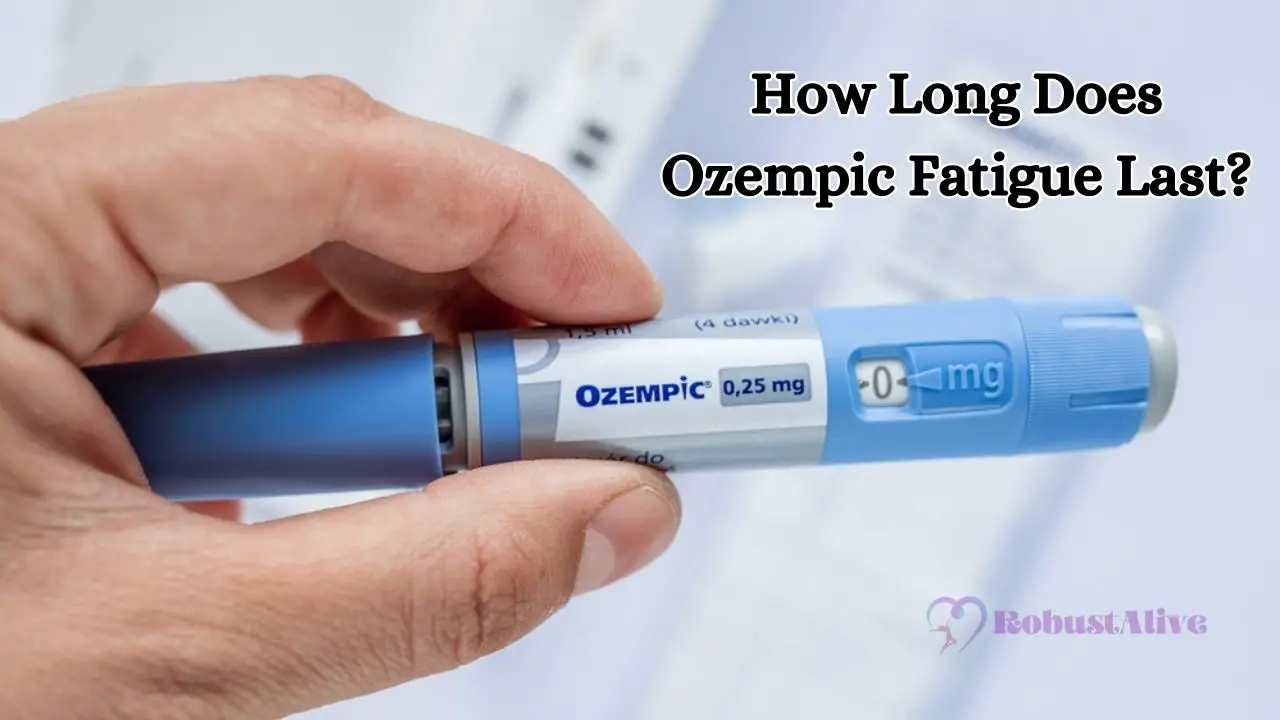Unravelling the Enigma: How Long Does Ozempic Fatigue Last?

Ozempic is a revolutionary medication used to manage type 2 diabetes. It is known for its significant effectiveness in controlling blood sugar levels and promoting weight loss. If you or a loved one have recently started using Ozempic, you may experience some side effects, including fatigue. Fatigue is a common concern, and it’s natural to wonder: how long does Ozempic fatigue last?
The duration of Ozempic-induced fatigue varies from person to person. Some experience for a few days or weeks. However, medications differ based on age, overall health, dosage, and how the body adapts to the treatment.
In this article, we’ll delve into the topic of Ozempic-induced fatigue. We also explore its duration, underlying causes, and effective management strategies. Understanding these aspects will help you gain valuable insights into this temporary side effect and how to cope with it.
How Long Does Ozempic Fatigue Last?
Ozempic-induced fatigue varies among individuals. Therefore, exploring studies, clinical trials, and participant experiences is essential to understanding their duration and potential influencing factors. Factors such as individual differences, underlying health conditions, and dosage can affect the period of fatigue.
Those who take Ozempic experience more prolonged fatigue during the initial weeks of treatment, while others continue throughout their treatment period. Additionally, existing medical conditions or medications may also impact fatigue duration. Overall, it takes 1 to 2 weeks for Ozempic fatigue to last.
How Do You Prevent Fatigue with Ozempic?
Feeling fatigue is a common fact when you are taking the medicine. But can Ozempic cause extreme fatigue? When you interact with other medications, you may feel exhausted. Now the question is how to fight fatigue from Ozempics. Can I do anything to manage the fatigue while my body adjusts to Ozempic? A slight change in habit and regular activity will help you eliminate these. Here are some healthy adjustments that help prevent fatigue while using Ozempic:
-
Specific activities
Stay Hydrated: Drinking enough water throughout the day helps reduce fatigue.
Adequate Sleep:
- Ensure you’re getting enough quality sleep each night.
- Sleep early, create a consistent bedtime routine, remove screens from the bedroom, keep the bedroom dark, and use white noise.
- Avoid caffeine, large meals, and alcohol before bedtime.
Regular Exercise: Regular physical activity boosts energy levels and moods. It improves cognitive function. Exercise brings fresh oxygenated blood to your brain, heart, lungs, muscles, and other organs. Let them function effectively. Keep you energetic and alert the whole day.
Manage Stress:
- Practice stress-reducing techniques.
- Continue to do meditation, deep breathing, or yoga.
- Set away some time to care for yourself.
These all boost your moods and impact your energy level and overall mental health. Stress and depression are the core symptoms of fatigue. To get relief from them, spend a few minutes, and you will get an enormous result.
Monitor Blood Sugar: Keep track of your blood sugar levels. Always keep a portable blood sugar machine and follow your healthcare provider’s recommendations.
-
Specific foods you should eat
Balanced Diet: Eating a balanced diet with regular meals maintains energy levels. Keep lean proteins like eggs, beans, and lean meat. You can include oatmeal and brown rice in your menu. Choose food with a low glycemic index like roasted chick peas. Eat high-quality fats as well, such as fish, olive oil, seeds, and nuts.
Lean protein: Include sources of lean protein. Include seafood, meat, eggs, and beans. Dairy products with low fat will improve the quality of your meal.
Green, leafy vegetables: Consume lots of green, leafy vegetables. Kale, spinach, arugula, and other nutrient-rich vegetables will help you to prevent weakness, dizziness. Remember, low-carb vegetables are the healthiest choice.
Onions and peppers: These vegetables can add flavour and nutrients to your dishes
Fruits: Include diabetes-friendly fruits due to their lower sugar content. Apples, berries, and citrus fruits will be good choices.
Whole grains: Add whole grains to regular meals. Certainly, whole-wheat pasta, tortillas, quinoa, and brown rice are essential grains. These are high in fibre. They can also regulate blood sugar levels.
Healthy fats: Include in your menu sources of healthy fats like avocados, nuts, and seeds in moderation.
Does Ozempic Make You Tired And Sleepy?
Ozempic (semaglutide) belongs to a class of medications called GLP-1 receptor agonists. They treat type 2 diabetes. Glucagon-like peptide-1 receptors affect the nervous system to control blood sugar levels.
They influence the release of insulin and glucagon in the brain. The glucagon hormones control blood sugar, basically. They promote insulin secretion and inhibit glucagon release. GLP-1 receptor agonists lower blood sugar this way. But it also causes nausea, vomiting, and diarrhoea. Some people may experience nausea. GLP-1 is the reason behind these. In fact, as a side effect, you may feel tired and sleepy after taking Ozempic.
How Long Does Ozempic Stay in Your System?
According to study, Ozempic stays in your system for about five weeks. The half-life of Ozempic is approximately one week. Half of the medicine takes about one week to be eliminated from your system. The full effects of Ozempic take up to 8 weeks or longer.
After stopping Ozempic, the benefits from the medication decrease within a week after the last injection. However, The medication will still require five weeks after your last dose to completely leave your system. In fact, you may continue to experience side effects during this time.
Does Ozempic Make You Depressed?
Depression is a complex condition. You may experience this due to genetic, environmental, and neurochemical influences. While medication sometimes has side effects that impact mood. But depression is not listed as a common side effect of Ozempic.
Due to ozempic gastrointestinal issues, decreased appetite, and hypoglycemia (low blood sugar), some individuals’ moods are affected. But anyone can experience these effects, which are generally mild and temporary.
How Long Does It Take for Ozempic to Start Working?
Ozempic (semaglutide) typically starts working quickly, with its effects on blood sugar levels becoming apparent within a few days to a week after starting the treatment. However, it’s important to note that the full therapeutic benefits of Ozempic may take some time to be realized.
Here’s a general timeline of how Ozempic works:
Immediate Effects: After the first injection, Ozempic can begin to reduce post-meal blood sugar levels, as it enhances insulin secretion and reduces glucagon in response to food intake.
Weeks 1–4: People notice improved blood sugar control during the first few weeks of treatment, particularly after meals. Additionally, some individuals experience weight loss due to the appetite-suppressing effects of Ozempic.
Weeks 4–12: Ozempic’s effects on blood sugar control and weight loss typically continue to improve over this period.
Beyond 12 weeks: Ozempic’s therapeutic benefits continue to progress, leading to sustained improvements in blood sugar levels, weight loss, and overall glycemic control.
How Long Does It Typically Take for The Body to Adjust to Ozempic?
The injection of this powerful medication only recommends taking once per week. If you take one dose once a week, it takes 4–5 weeks to reach a steady state. Steady-state is the time when medications reach a stable concentration in the body. However, the full effect of Ozempic can take eight weeks or longer.
During the first four weeks of treatment, lower doses are injected to reduce side effects. But there are more effective doses to lower blood sugar. The starting amount of Ozempic is 0.25 mg, injected once weekly for four weeks. And then, the quantity is moved up to 0.5 mg once weekly. Although steady-state levels are reached in 4 to 5 weeks, clinical effectiveness with Ozempic varies from person to person. It takes longer due to individual differences.
Foods That Can Worsen Ozempic Fatigue
There are no specific foods that worsen Ozempic fatigue. However, for your convenience, we have gathered some general tips to manage fatigue while taking it. Here are some tips:
Avoid processed foods: Processed foods contain high calories, fat, and sugar. Intaking these undermines weight loss efforts and leads to fatigue.
Limit alcohol intake: Alcohol lowers blood sugar levels. In severe cases, it causes hypoglycemia when taken with Ozempic. So, avoid or limit alcohol intake while taking the medicine.
Eat slowly and with smaller meals: Eating slowly and with smaller meals helps manage nausea, bloating, and fatigue.
Are There Any Other Common Side Effects of Ozempic?
As we know, semaglutide activates the GLP-1 receptor. Due to the activation of the receptor and interactions with other medications side effects arise. The most common side effects of Ozempic, as reported in various sources, include:
- Nausea
- Vomiting
- Diarrhea
- Stomach (abdominal) pain
- Constipation
- Gastrointestinal upset (upset stomach)
- Reflux
- Loss of appetite
- Dizziness
- Headache
- Weakness
- Swelling/redness, or itchiness at the injection
Frequently Asked Questions (FAQs)
How long does the Ozempic pen last
Ozempic pens are available in different strengths. These are 0.25 mg, 0.5 mg, 1 mg, and 2 mg. The pen for 0.25 mg doses contains eight doses of 0.25 mg. And pen .5mg includes four amounts of 0.5 mg. Ozempic pen for 1 mg dose has four of the 1 mg dose. The pen for the 2 mg dose contains 8 mg of Ozempic. Taking it once a week can last for a whole month.
How do you get rid of fatigue from semaglutide?
Fatigue on semaglutide is temporary. It tends to improve over time. Also, your body will start to adjust to the medications. So first of all, you have to give it time to adjust. Moreover, diet maintenance, exercise, and a healthy lifestyle help you eliminate fatigue.
Why do I feel so weak about Ozempic?
Consuming ozempic impacts appetite regulation. When it starts to work, it activates GLP-1 receptors in the brain, particularly in the hypothalamus. Appetite control is connected with the hypothalamus. This activation leads to a reduction in appetite. It makes one feel full for a long time. That’s why ozempic may contribute to weight loss in some individuals. Due to eating less, sometimes you fail to meet the demand for vitamins and minerals. That makes you weak, dizzy, and tired.
Conclusion
So, how long does Ozempic fatigue last? I hope you know the answer now. However, take medicines correctly. Maintain a healthy, balanced diet. Engage in physical activities. Overall, maintain a healthy lifestyle. Spend quality time with friends and family. Stay positive. Also, give yourself time. Above all, love yourself. All these things help you get rid of fatigue and other side effects.





